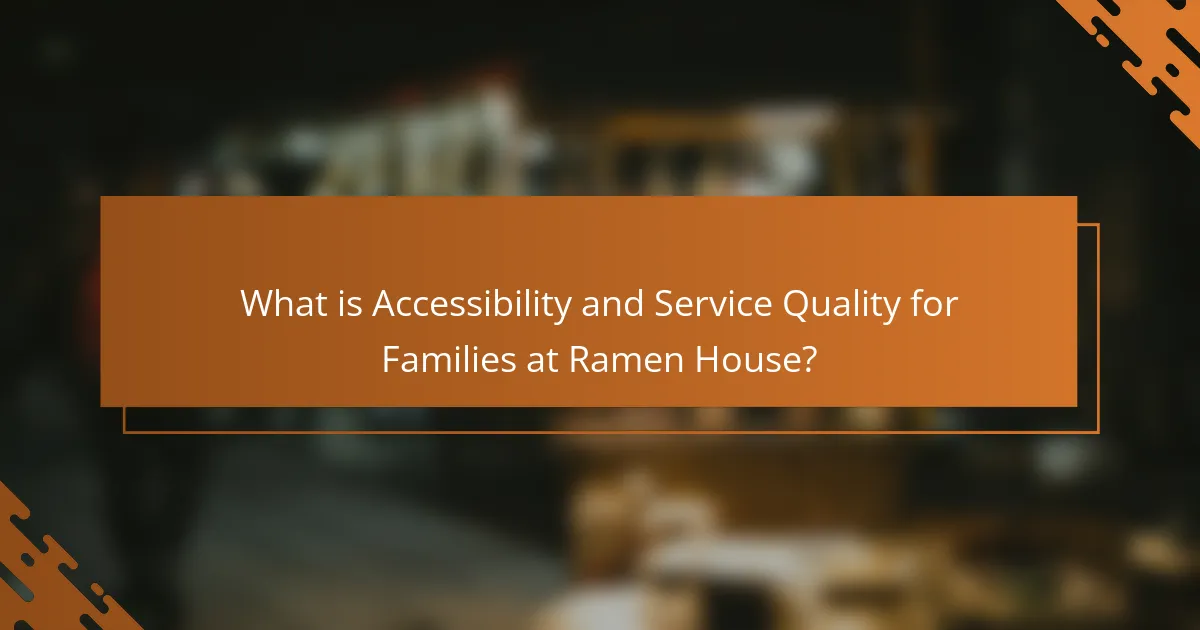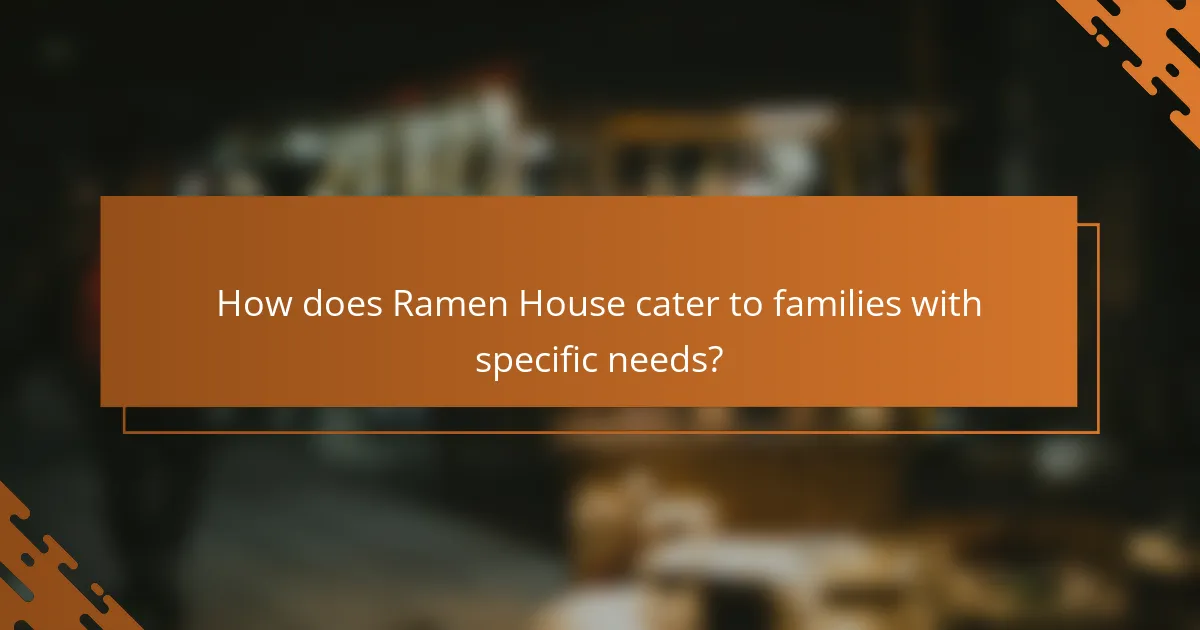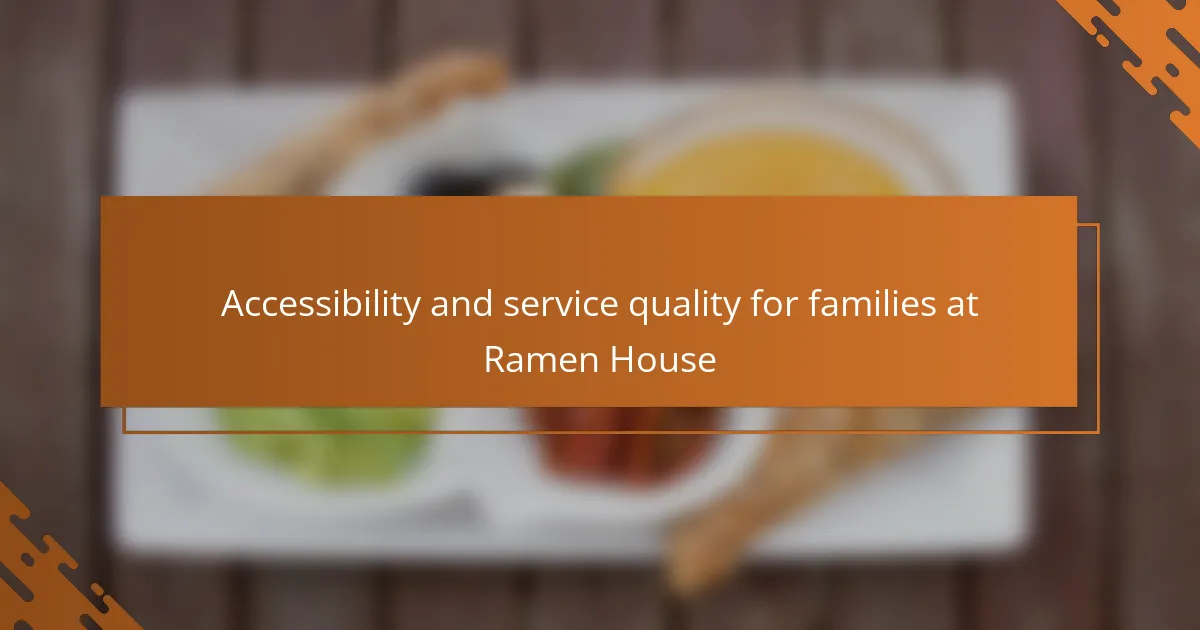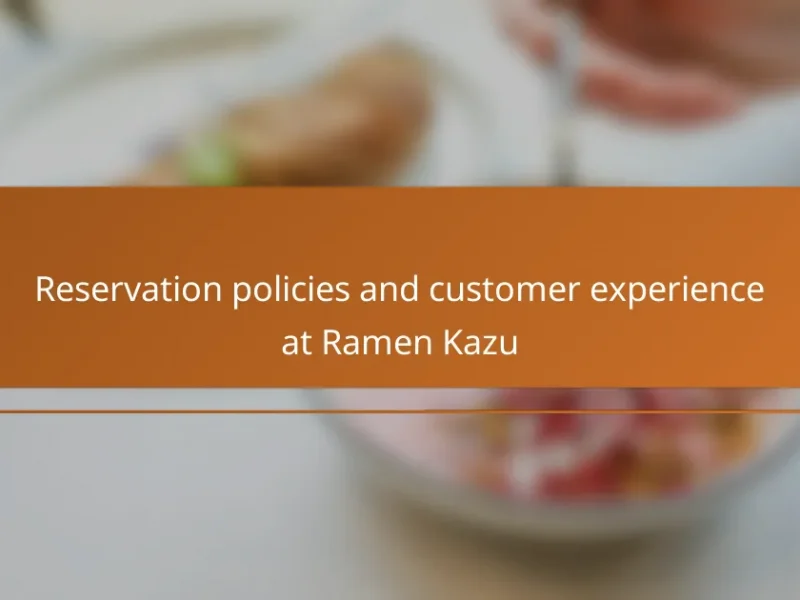
What is Accessibility and Service Quality for Families at Ramen House?
Accessibility for families at Ramen House refers to the ease of access to the restaurant’s facilities and services. This includes features like wheelchair ramps, spacious seating, and kid-friendly menus. Service quality pertains to the level of assistance and attentiveness families receive from staff. High service quality is characterized by friendly interactions, prompt service, and responsiveness to family needs. Research indicates that restaurants with good accessibility and service quality see higher family patronage. For instance, a study by the National Restaurant Association highlights that families prioritize establishments that accommodate children and those with special needs.
How is accessibility defined in the context of Ramen House?
Accessibility in the context of Ramen House refers to the ease with which families can access the restaurant and its services. This includes physical access to the location, such as parking availability and entrance design. It also encompasses the menu options available for various dietary needs, ensuring inclusivity. Ramen House aims to provide a welcoming environment for families with children, including amenities like high chairs and children’s menus. Additionally, staff training on customer service enhances the overall experience for families. These factors contribute to a positive dining experience, making Ramen House accessible to a diverse clientele.
What specific features enhance accessibility for families at Ramen House?
Ramen House enhances accessibility for families through features like spacious seating arrangements and high chairs. The restaurant provides wide aisles for easy navigation with strollers. It also offers a kid-friendly menu with smaller portion sizes. Additionally, Ramen House has staff trained to assist families with special needs. Accessible restrooms are available for convenience. These features collectively create a welcoming environment for families dining together.
How does Ramen House ensure a welcoming environment for families?
Ramen House ensures a welcoming environment for families by providing spacious seating arrangements. The restaurant features family-friendly booths and tables that accommodate larger groups. Additionally, the menu offers kid-friendly options that appeal to younger diners. Ramen House also maintains a warm and friendly staff trained to engage with families. The establishment includes amenities such as high chairs and changing tables for infants. Special promotions and discounts for families are regularly offered to enhance the dining experience. These measures collectively create an inviting atmosphere for families dining together.
What factors contribute to service quality at Ramen House?
Service quality at Ramen House is influenced by several key factors. These include staff training, menu variety, and customer feedback mechanisms. Well-trained staff provide efficient and friendly service, enhancing the dining experience. A diverse menu caters to various dietary preferences and family needs. Regularly gathering customer feedback allows Ramen House to make improvements based on patron preferences. Additionally, cleanliness and ambiance contribute to a welcoming atmosphere. These elements collectively ensure a high level of service quality for families dining at Ramen House.
How does staff training impact service quality for families?
Staff training significantly enhances service quality for families. Trained staff are more knowledgeable about menu items and family-friendly services. This knowledge leads to better recommendations and a more enjoyable dining experience. Additionally, training improves staff communication skills. Effective communication fosters a welcoming atmosphere for families. Research indicates that establishments with well-trained staff receive higher customer satisfaction ratings. According to a study by the American Hotel and Lodging Educational Institute, trained employees lead to a 20% increase in customer loyalty. Overall, staff training is crucial for delivering exceptional service to families.
What role does customer feedback play in improving service quality?
Customer feedback is crucial for improving service quality. It provides direct insights into customer experiences and expectations. By analyzing feedback, businesses can identify specific areas that need enhancement. This process helps in addressing service gaps effectively. For instance, a study by the American Customer Satisfaction Index found that companies that actively seek and act on customer feedback see a 10-15% increase in customer satisfaction scores. Implementing changes based on feedback fosters loyalty and repeat business. Thus, customer feedback serves as a vital tool for continuous improvement in service quality.
Why is accessibility important for families dining at Ramen House?
Accessibility is important for families dining at Ramen House because it ensures that all members can comfortably enjoy their meal. Families often include individuals with varying mobility needs, including children and elderly members. Accessible entrances, seating, and restrooms facilitate a welcoming environment. This inclusivity enhances the dining experience for everyone. Research indicates that 1 in 5 people in the U.S. have a disability, highlighting the need for accessible dining options. Ramen House’s commitment to accessibility can attract a wider customer base. Additionally, it fosters a positive reputation within the community. Overall, accessibility directly impacts customer satisfaction and loyalty.
How does accessibility affect the dining experience for families?
Accessibility significantly enhances the dining experience for families. Accessible facilities allow families with children, elderly members, or individuals with disabilities to enjoy meals comfortably. Features such as ramps, wide doorways, and accessible restrooms are crucial. According to the U.S. Access Board, 1 in 5 Americans has a disability. This means that restaurants must accommodate diverse needs to attract a wider customer base. Additionally, accessible seating arrangements can improve social interactions among family members. A welcoming environment fosters positive dining experiences. Thus, accessibility directly influences family satisfaction and loyalty to dining establishments.
What are the potential barriers families face when accessing Ramen House?
Families may face several potential barriers when accessing Ramen House. Limited parking availability can make it difficult for families to find space nearby. Long wait times during peak hours can discourage families from dining in. Menu options may not cater to all dietary restrictions, limiting choices for some family members. Additionally, the restaurant’s location might not be easily accessible via public transportation. High noise levels can create an uncomfortable dining environment for families with young children. Finally, the overall cost of dining out may be a barrier for some families, impacting their ability to enjoy meals at Ramen House.

How does Ramen House cater to families with specific needs?
Ramen House caters to families with specific needs by offering a diverse menu that includes vegetarian and gluten-free options. This ensures that families with dietary restrictions can find suitable meals. The restaurant also provides high chairs and booster seats for young children. Additionally, Ramen House has a spacious layout, making it easy for families to navigate with strollers. The staff is trained to accommodate special requests and dietary concerns. Furthermore, Ramen House offers takeout services for families who prefer dining at home. These features collectively enhance the dining experience for families with specific needs.
What accommodations are available for families with young children?
Ramen House offers several accommodations for families with young children. These include high chairs for infants and toddlers. The restaurant also provides a kids’ menu featuring smaller portions and child-friendly options. Additionally, Ramen House has changing tables in restrooms for convenience. The staff is trained to assist families with special requests, ensuring a comfortable dining experience. Family-friendly seating arrangements are available, accommodating strollers and larger groups. Overall, Ramen House prioritizes accessibility and comfort for families dining with young children.
How does Ramen House address dietary restrictions for families?
Ramen House addresses dietary restrictions for families by offering a variety of customizable menu options. The restaurant provides gluten-free noodles and vegetarian broth as alternatives. Families can request modifications to dishes to accommodate allergies or specific dietary needs. Additionally, Ramen House staff are trained to handle dietary inquiries effectively. This ensures that families receive accurate information regarding ingredients. The availability of allergen-free options demonstrates Ramen House’s commitment to inclusivity. Overall, these practices create a welcoming dining experience for families with dietary restrictions.
What amenities enhance the experience for families at Ramen House?
Ramen House offers several amenities that enhance the experience for families. These include spacious seating arrangements that accommodate larger groups. High chairs are available for younger children, ensuring comfort and safety. A children’s menu features smaller portions and kid-friendly options. The restaurant provides a family-friendly atmosphere with vibrant decor and engaging staff. Additionally, Ramen House often includes games or activities to entertain children while waiting. These amenities create a welcoming environment for families dining together.
How do seating arrangements impact family dining experiences?
Seating arrangements significantly influence family dining experiences. They affect communication, comfort, and engagement among family members. For instance, a circular table promotes better interaction compared to a linear setup. Comfortable seating can enhance the overall dining experience by reducing physical strain. Studies show that families seated together report higher satisfaction levels. A well-designed layout can also accommodate children and enhance accessibility. Proper spacing allows for easy movement, which is crucial for families with strollers or mobility aids. Overall, thoughtful seating arrangements create a more enjoyable and inclusive dining atmosphere.
What entertainment options are provided for children at Ramen House?
Ramen House provides various entertainment options for children. These options include coloring books and crayons to engage young guests. Additionally, there may be kid-friendly menu items to enhance their dining experience. Some locations might offer small toys or games to keep children entertained while waiting for their meals. These amenities aim to create a family-friendly atmosphere.

What are the best practices for ensuring accessibility and service quality?
Ensuring accessibility and service quality involves implementing several best practices. First, establish clear communication channels for feedback. This allows families to express their needs and concerns effectively. Next, provide staff training on accessibility standards. Training ensures that all employees understand how to assist families with varying needs. Additionally, create an inclusive environment with physical accommodations. This includes ramps, accessible restrooms, and seating arrangements.
Regularly assess the facilities for compliance with accessibility regulations. This ensures ongoing adherence to legal standards. Also, offer diverse menu options to cater to dietary restrictions. This inclusivity enhances service quality for all families. Finally, engage with the community to understand specific accessibility challenges. This engagement fosters trust and improves overall service quality.
How can families provide feedback to improve their experience at Ramen House?
Families can provide feedback to improve their experience at Ramen House through various channels. They can fill out comment cards available at the restaurant. Additionally, families can engage in online surveys sent via email after their visit. Social media platforms also serve as a venue for families to share their thoughts. Direct communication with staff during or after the meal can yield immediate feedback opportunities. Families can also leave reviews on popular restaurant review sites. These methods allow Ramen House to gather constructive feedback. Engaging with customers this way helps identify areas for improvement.
What tips can families follow to maximize their dining experience at Ramen House?
To maximize their dining experience at Ramen House, families should consider visiting during off-peak hours. This helps avoid long wait times. Ordering shareable dishes encourages family bonding and allows everyone to try different flavors. Utilizing the menu’s family meal options can provide a cost-effective solution. Engaging with staff for recommendations can enhance the meal selection process. Ensuring everyone in the family has a say in the meal choices promotes inclusivity. Lastly, taking advantage of any loyalty programs can lead to future savings. These strategies collectively improve the overall dining experience at Ramen House.
Accessibility and service quality are critical components for families dining at Ramen House. The article examines how the restaurant enhances accessibility through features like wheelchair ramps, spacious seating, and kid-friendly menus, while also emphasizing the importance of attentive service from well-trained staff. Key factors affecting service quality, such as customer feedback and staff training, are discussed, alongside the significance of creating an inclusive environment for families with diverse needs. Additionally, the article highlights specific amenities and accommodations that Ramen House provides to ensure a positive dining experience for families.


